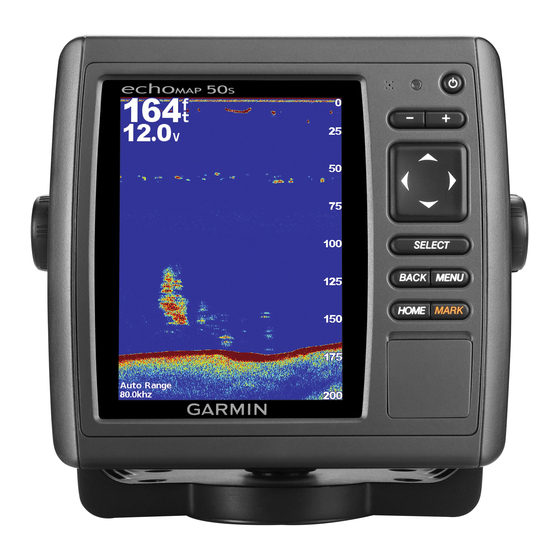2
Insert the memory card
3
Press the card in until it clicks.
4
Close the door.
Charts and 3D Chart Views
The chartplotters have a basic imagery map. The charts and 3D
chart views listed below are available on the chartplotter. The
charts and views that are available depend on the map data and
accessories used.
You can access the charts and chart views by selecting Charts.
Navigation Chart: Shows navigation data available on your
pre-loaded maps and from supplemental maps, if available.
The data includes buoys, lights, cables, depth soundings,
marinas, and tide stations in an overhead view.
Perspective 3D: Provides a view from above and behind the
boat (according to your course) and provides a visual
navigation aid. This view is helpful when navigating tricky
shoals, reefs, bridges, or channels, and is beneficial when
trying to identify entry and exit routes in unfamiliar harbors or
anchorages.
Mariner's Eye 3D: Shows a detailed, three-dimensional view
from above and behind the boat (according to your course)
and provides a visual navigation aid. This view is helpful
when navigating tricky shoals, reefs, bridges, or channels,
and when trying to identify entry and exit routes in unfamiliar
harbors or anchorages.
NOTE: Mariner's Eye 3D and Fish Eye 3D chart views are
available with premium charts, in some areas.
Fish Eye 3D: Provides an underwater view that visually
represents the sea floor according to the chart information.
When a sonar transducer is connected, suspended targets
(such as fish) are indicated by red, green, and yellow
spheres. Red indicates the largest targets and green
indicates the smallest.
NOTE: Mariner's Eye 3D and Fish Eye 3D chart views are
available with premium charts, in some areas.
Fishing Chart: Provides a detailed view of the bottom contours
and depth soundings on the chart. This chart removes
navigational data from the chart, provides detailed
bathymetric data, and enhances bottom contours for depth
recognition. This chart is best for offshore deep-sea fishing.
NOTE: The offshore Fishing chart is available with premium
charts, in some areas.
Radar Overlay: Superimposes radar information on the
Navigation chart or the Fishing chart, when the chartplotter is
connected to a radar. This feature is not available with all
models.
Navigation Chart and Offshore Fishing Chart
NOTE: The offshore Fishing chart is available with premium
charts, in some areas.
The Navigation and Fishing charts allows you to plan your
course, view map information, and follow a route. The Fishing
chart is for offshore fishing.
2
with the label facing to the right.
To open the Navigation chart, select Charts > Navigation
Chart.
To open the Fishing chart, select Charts > Fishing Chart.
Zooming In and Out of the Chart
The zoom level is indicated by the scale number at the bottom
of the chart. The bar under the scale number represents that
distance on the chart.
• Select
to zoom out.
• Select
to zoom in.
Panning the Chart
You can move the chart to view an area other than your present
location.
1
From the chart, drag the navigation screen or use the arrow
keys.
2
Select Stop Panning or Back to stop panning and return the
screen to your present location.
Selecting an Item on the Map Using the Device Keys
1
From a chart or 3D chart view, select , ,
the cursor.
2
Select Select.
Chart Symbols
This table contains some of the common symbols you might see
on the detailed charts.
Icon
Description
Buoy
Information
Marine services
Tide station
Current station
Overhead photo available
Perspective photo available
Other features common to most charts include depth contour
lines (with deep water represented in white), intertidal zones,
spot soundings (as depicted on the original paper chart),
navigational aids and symbols, obstructions, and cable areas.
Navigating to a Point on the Chart
The Auto Guidance feature is based on electronic chart
information. That data does not ensure obstacle and bottom
clearance. Carefully compare the course to all visual sightings,
and avoid any land, shallow water, or other obstacles that may
be in your path.
When using Go To, a direct course and a corrected course may
pass over land or shallow water. Use visual sightings, and steer
to avoid land, shallow water, and other dangerous objects.
NOTE: The offshore Fishing chart is available with premium
charts, in some areas.
, or
to move
CAUTION
Charts and 3D Chart Views

